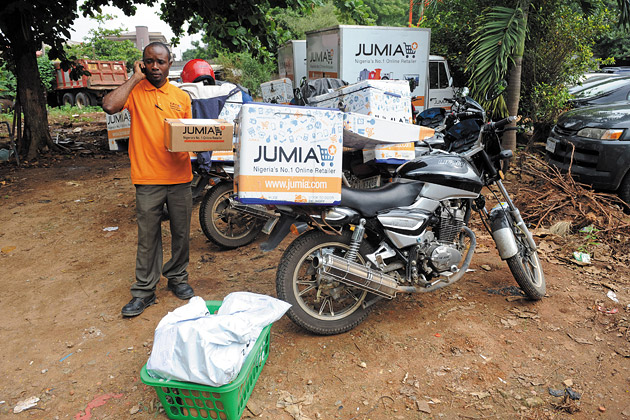According to Euromonitor, the world’s fastest growing economies by 2030 will be in Africa. This consequently makes the continent the next big e-commerce market. And as this positive narrative continues to place Africa as a top investment destination, the need for advanced logistics systems has become inevitable. The growth of e-commerce will significantly depend on the quality and efficiency of logistics networks; from intra and cross trade to financial transactions in payment of goods and services.
When writing the African e-commerce story, I often leap at the chance to explore only the enviable milestones the continent has made. Nevertheless, there still exist formidable challenges especially in logistics, a vital constituent of the industry. The African Development Bank, in its 2019 African Economic Outlook, notes that “trade costs due to poorly functioning logistics markets may be a greater barrier to trade than tariffs and nontariff barriers”. This side of the story must also be told; if we are to find sustainable solutions to what could be the gateway to growing Africa’s e-commerce by leaps and bounds.
Unsatisfactory National Address Systems and Transport Infrastructure
One of the biggest logistics’ hurdles holding back the industry is the lack of proper national address systems in most African countries. This, coupled by poor road networks, make it even harder to conveniently deliver products to customers. Consequently, companies have had to rely on fairly descriptive addresses and landmarks provided by the customers during the initial stages of the online purchase process. The delivery persons are also required to keep in constant contact with clients when delivering products, to receive further directions while en-route.
While generally Africa’s infrastructure lags behind that of its counterparts including America and Europe, it is worth of note that each country has its own value proposition. In 2018, the World Bank’s Logistics Performance Index placed South Africa, Kenya, Rwanda, and Côte d’Ivoire as the top 4 best performing countries in Africa, while Somalia, Sierra Leone, Eritrea and Zimbabwe were at the bottom 4.
In most African countries, the result of the poor road infrastructure is heavy traffic jams that lead to delayed deliveries, canceled orders for the on-demand services and subsequently loss of revenue. Alternative modes of transport have therefore come into play in some markets like Kenya and Nigeria, with the use of easy to navigate motorcycles, popularly known as Bodabodas. With about 1.2 million motorcycles in the passenger transport business, Kenyan ecommerce companies have strived to tap into this market by using Bodabodas to swiftly deliver products especially within busy cities.
“There are huge opportunities for logistics to grow e-commerce, but few established players exist in the market,” notes Apoorva Kumar, Jumia’s SVP of Logistics. Present in 14 African countries, Jumia is one of the ecommerce players building logistics and fulfilment infrastructures to ease delivery of products to consumers using both vehicles and bodabodas.

Providentially, technology has been a boon to the logistics industry. In Nigeria and Kenya, Jumia is running a well-established system using Machine Learning, relying on GPS enabled delivery apps. The coordinates collected in the first delivery are then registered and used in making a logistics network for future conveyance.
In Rwanda, companies like Zipline are leading the way in commercial drone deliveries. While initially focused on delivering blood to remote health centers that are otherwise difficult to reach fast due to Rwanda’s hilly terrain; it is expected that Zipline’s drones will in future be used in other sectors including e-commerce. Back in Kenya, Astral Aerial Solutions is using drones for among other services, last mile deliveries. The company aims to, in its words, “open up Kenya’s hard to reach regions to new and exciting business opportunities”.
The possibilities for a better future in logistics, in my view, are endless! And as Apoorva reiterates, companies cannot solely build a successful logistics system. “It requires integrating various systems and partners to create a big enough network to serve the growing needs of the e-commerce consumers,” he says, calling for both private and public partnerships to this endeavor.
What Then, Does the Future Hold?
Data by logistics consulting firm Knight Frank, shows that the cost of transportation represents 50% to 75% of the retail price of the goods. This alone, underpins the demand for long-term strategies to the logistics challenges in Africa.
From delayed deliveries between local destinations to sluggish growth of cross-border trade, the effects are being felt across the board. Modern online retailing is headed towards pre-orders, requiring mature infrastructure for both small and medium businesses. This will help meet the packaging, storage, distribution, freight and last-mile-delivery requirements. Though challenging, Africa is a land full of commercial opportunities; causing a scramble for a piece of the pie among international investors.
Therefore, for e-commerce companies in Africa to achieve sustainable bottom-line growth, there needs to occur more tech-empowered handshakes between multiple service providers across markets. Governments have the responsibility to create one-window-policies that empower digital payment solutions as well as logistics infrastructure including road networks, air cargo handling systems and warehouses among others. Similarly, e-commerce and logistics powerhouses like Jumia should commit to empower more upcoming entrepreneurs. They must also use their leading positions to continue paving the way for economic integration in Africa.
Article by Josephine Wawira
Also Read: The Huawei P30 Lite Has Been Discounted On Jumia, Available for Ksh 23,500



